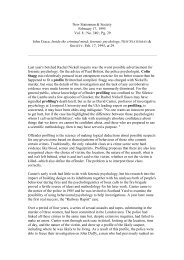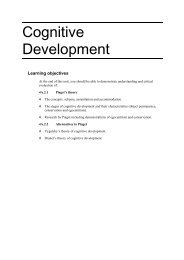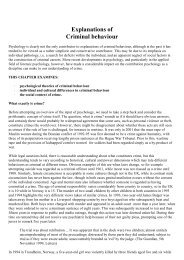Ch 11 - Jeff Standen
Ch 11 - Jeff Standen
Ch 11 - Jeff Standen
Create successful ePaper yourself
Turn your PDF publications into a flip-book with our unique Google optimized e-Paper software.
Consider the following 'irrational beliefs'.<br />
• I must always please others.<br />
• I must always be perfect in what I do.<br />
Anyone holding these beliefs is doomed to failure and<br />
disappointment. It is impossible to please all of the people<br />
all of the time. And no matter how hard a person strives, a<br />
life of perfection is beyond their reach.<br />
Cognition and depression<br />
Aaron Beck's (1967; 1997) theory of depression illustrates<br />
the cognitive approach to psychological disorders.<br />
According to Beck, negative thinking produces negative<br />
moods which can lead to depression. Beck uses the term<br />
cognitive triad to refer to the three main forms of negative<br />
thinking - negative views of 1) the self ('I am worthless'), 2)<br />
the world ('Everything is against me'), and 3) the future<br />
('Nothing is ever going to change').<br />
Negative thoughts can produce errors in thinking. These<br />
errors include:<br />
• Arbitrary inference A conclusion based on insufficient<br />
evidence or no evidence at all. For example, my car<br />
broke down because I am a worthless person.<br />
• Selective abstraction A conclusion based on one of<br />
many aspects of a situation. I forgot to put salt in the<br />
potatoes which ruined the entire dinner party and<br />
showed what a useless host I am.<br />
• Overgeneralisation A generalisation based on a single,<br />
often trivial event. A teacher assumes that he is no good<br />
at his job because a student falls asleep in his class.<br />
Beck argues that negative thoughts lead to negative<br />
emotions which can lead to depression.<br />
There is plenty of evidence to support Beck's theory.<br />
Research indicates that compared to nondepressed people,<br />
depressed individuals are more negative in terms of<br />
themselves, the world, and the future. In addition, they are<br />
more likely to make the kind of errors in thinking that Beck<br />
identifies. The key question, however, is whether negative<br />
thinking precedes and contributes to the onset of depression<br />
or whether it results from depression and contributes to its<br />
maintenance. According to Davison and Neale (1998), 'the<br />
relationship in all likelihood works both ways; depression<br />
can make thinking more negative, and negative thinking can<br />
probably cause and certainly worsen depression'.<br />
Longitudinal studies - studies of a group of people over<br />
time - are needed to investigate this question. The ongoing<br />
Temple-Wisconsin study of cognitive vulnerability to<br />
depression provides some preliminary answers. A sample of<br />
first year university students, none of whom was suffering<br />
from depression at the time, were assessed every few<br />
months. Results for the first 21/2 years suggest that those<br />
students who were prone to negative thinking were more<br />
likely to become depressed. Seventeen per cent of high-risk<br />
participants (those with high scores for negative thinking)<br />
compared to 1% of low-risk participants (those with low<br />
scores) went on to experience a period of severe depression<br />
(discussed in Barlow and Durand, 1999).<br />
Cognitive therapy<br />
As the model implies, cognitive therapy for psychological<br />
disorders involves changing thoughts in order to change<br />
emotions and behaviour. Albert Ellis (1962), developed<br />
rational-emotive therapy which, as its name suggests,<br />
encourages rational thinking in order to change emotions.<br />
The therapist's job is to help their clients to recognise the<br />
irrational assumptions which govern their lives and to<br />
change them into rational and positive views of themselves<br />
and the world.<br />
Beck's cognitive therapy, which is often used in cases of<br />
depression, encourages clients to challenge negative<br />
thoughts, and change them into more constructive ones.<br />
Clients are helped to recognise errors in thinking and<br />
encouraged to correct them. Beck claims that this will<br />
change their emotions and behaviour and, in many cases,<br />
lift their depression.<br />
The cognitive model - evaluation<br />
Successful treatment Research indicates that Beck's<br />
cognitive therapy is as successful as antidepressant drugs in<br />
treating depression (Hollon & Beck, 1994). This, in itself,<br />
provides support for the cognitive model.<br />
Cause and effect The cognitive model has been criticised<br />
for seeing thoughts as the cause of psychological<br />
disorders. Critics argue that because people with<br />
depression tend to see the world in negative terms, then<br />
negative thinking is a consequence of their depression<br />
rather than its cause. However, as the provisional results of<br />
the Temple-Wisconsin study indicate, negative thinking, in<br />
and of itself, appears to make people more vulnerable to<br />
depression.<br />
Origins of cognitive errors The cognitive model has been<br />
criticised for failing to explain where negative thoughts<br />
come from in the first place. However, Beck argues that<br />
experiences in childhood and adolescence, such as loss of a<br />
( Summary 1<br />
The cognitive model assumes that people's thoughts<br />
direct their emotions and behaviour.<br />
Cognitive errors and negative thoughts can affect<br />
mood and behaviour, and can lead to psychological<br />
disorders.<br />
Therapy involves the correction of cognitive errors and<br />
the translation of negative thoughts into positive<br />
thoughts.







